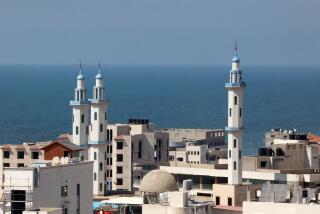Abandoned Iraqi Papers Make Blockbuster Book : Publishing: Fifteen-pound compilation could be called the mother of all manuscripts.
- Share via
KUWAIT — First there were the instant books on the Persian Gulf crisis, then the more thoughtful ones.
Now a Kuwaiti publishing house has come out with what Western advertisers could call the mother of all those manuscripts.
Weighing in at 15 pounds and with a price tag of $170, “The Documents Speak” is 1,328 pages packed with facsimiles of documents abandoned by the retreating Iraqis.
Selected by Kuwaiti resistance fighter Sheik Azbi Fahd al Sabah, son of the only member of the ruling family killed in the invasion, the documents confirm most of what the world heard about the Iraqi occupation--and more so.
They paint a picture of an Iraqi administration constantly ill at ease in hostile territory, a government in Baghdad that saw Kuwait as a treasure trove of loot and, in the final stages of the conflict, an Iraqi army fiddling while Rome burned.
Some are frightening, some poignant, some farcical.
They also prove once and for all that the Kuwaiti resistance inside the occupied emirate was a major preoccupation for Iraqi forces throughout allied preparations for the war, which eventually broke out in January, 1991.
Circular after circular told Iraqi soldiers to be on guard against car bombs, resistance fighters who invited them to a last poisoned dinner and Kuwaiti women who tried to lure them to their death with amorous phone calls.
“The number of martyrs and wounded brought to hospitals has started to increase, which shows that resistance activity is rising,” wrote an Iraqi official in late August, 1990.
The usual Iraqi response was to “do the necessary.”
But it seems the police force at least was not getting the message. In October, 1990, its boss prescribed more training on aiming straight and lectures on not being afraid of the legal consequences when shooting to kill.
The ruling Baath Party took a more direct approach.
“Anyone who impairs security . . . is liable to a year (in prison) under normal circumstances. Under present conditions he must be killed,” according to the minutes of a party meeting.
The party also brought with it a method of punishment it has practiced for years at home.
“If any politician is arrested . . . his family should also be held and his house demolished with all the goods inside. The fate of the family will then be decided,” the minutes stated.
As the low-level guerrilla war continued, Iraqi groups of every kind--from the Chamber of Commerce to the Iraqi Chemists Union to the Assn. of Folk Poets--descended on Kuwait to “inventory and remove to Baghdad” the possessions of their former Kuwaiti counterparts.
The Ministry of Local Government said it wanted to take away all the property at a tourist complex on Faylakah Island.
One of the few applicants rebuffed was the Information Ministry, which wanted all the electronic equipment used at multilingual conferences in the Hyatt Regency hotel. The governor argued that the hotel was private property.
Ahmed Hussein Khudayer, then head of the Presidential Diwan in Baghdad and now Iraqi foreign minister, ordered in September that all goods in all ports and warehouses should be confiscated.
The looting became more frantic as U.N. sanctions began to bite. Ministries sent memos asking the authorities in Kuwait to remove all controls on the movement of items such as tires, batteries and raw materials.
The documents, maybe because they are selective, do not show the Palestinian community of Kuwait in a kind light. When they appear, it is usually as informers, degenerates or members of the pro-Iraqi Popular Army.
One of the officials of the Palestine Liberation Organization in Kuwait, Jihad Youssef Mahmoud, divided the community into three groups in a message to his boss.
Some had turned to prostitution, rape, theft and looting, some were supplying information to Iraqi military intelligence and others were putting themselves in danger by helping the Kuwaiti resistance, he wrote.
On Feb. 10, 1991, Iraqi troops reported that enemy planes were dropping dummy paratroops off the coast.
Twelve days later Capt. Jumaa Ibrahim Yassin sent out a cryptic warning to all his platoons.
“Please be advised of the need to look out for and deal with the war dogs which the enemy uses in various ways. Please do what is necessary,” he wrote.
More to Read
Sign up for Essential California
The most important California stories and recommendations in your inbox every morning.
You may occasionally receive promotional content from the Los Angeles Times.













